|
John Ford is a rightly revered director whose filmography is peppered with a number of bona fide classics and fascinating if sometimes lesser-known works, something I suspect Indicator's upcoming Blu-ray box set John Ford at Columbia 1935–1958 will help to confirm. Despite working in a range of genres, it's for his westerns that he is most fondly remembered, three of which are thematically linked and have become known as The Cavalry Trilogy. I'm sure I don't have to explain in detail why. The first was the 1948 Fort Apache, which was followed the next year by She Wore a Yellow Ribbon and concluded in 1950 with Rio Grande. There are elements that link the three films aside from their settings and the fact that their stories revolve around a cavalry company and their commander, who in each of the three films was played by John Wayne. All three movies were based on stories by writer James Warner Bellah, all feature Victor McLaglen as a blustering, drink-loving Irish company sergeant, and despite telling different stories with theoretically different characters, there is the subtle suggestion of a connection between them in the re-use of names for two of the key characters. Intriguingly, both appear to rise in rank as the series progresses, with McLaglen's Top Sergeant Quincannon from She Wore a Yellow Ribbon elevated to the post of Sergeant-Major in the later Rio Grande, while Wayne's Captain Kirby York is promoted to Lieutenant Colonel at the end of Fort Apache, and that's the rank he holds in the trilogy's final film, albeit with an 'e' added to the end of his surname. There is, however, nothing in the individual stories to suggest that they are otherwise linked, but that hasn't stopped speculation that Rio Grande could be seen as an unofficial sequel to Fort Apache. It's a theory undermined by the closeness of the years in which the two films are set (Fort Apache, being set at the time of General Custer's defeat at the battle of Little Big Horn, would be 1876, whereas events in Rio Grande are said to take place "fifteen years after the Shenandoah," which would make it 1879) and the fact that in the second film Yorke has an estranged wife and a teenage son, neither of whom were mentioned in Fort Apache.
But I'm getting ahead of myself. In Rio Grande, Captain Yorke the commander of a cavalry troop on the Texas frontier that is charged with protecting settlers from attacks by groups of Apaches warriors. When a party of new young recruits arrives, a startled Yorke discovers that it includes his teenage son Jeff (Claude Jarman Jr.), who joined up after failing his exams at West Point and whom Yorke hasn't seen for fifteen years. When Jeff is injured in a fight with one of the other troopers, his mother Kathleen (Maureen O'Hara) turns up with the intention of taking him back home, but her presence impacts most on Kirby and prompts him to reflect on his past actions and decisions.
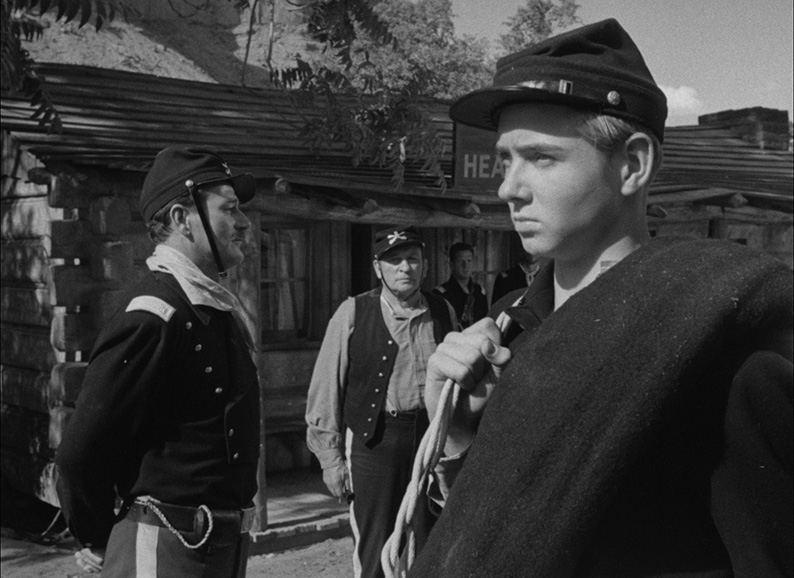
What such a compressed plot summary fails to capture is the poetry with which much of this story unfolds. Take the opening scene, which plays out without a word of dialogue, as a company of soldiers arrives back at the settlement, a few of them injured and lying on horse-drawn travois, and what we instantly deduce are their wives look anxiously on to see if their husbands have survived unscathed from this particular sortie. In one telling moment two women are observed in medium closeup, and as a relieved smile breaks across the face of one woman and rushes forward, the other continues to look worriedly back and forth for her man. We never learn if her husband is one of the fortunate, but that's not what this sequence is about. We're not being introduced to characters and their individual stories but to the situation in which that story will unfold. There's no opening caption or narration to set the scene – one that is rerun from a personal viewpoint much later – just some exquisite visual storytelling coupled with a faith in our perhaps genre-inspired familiarity with enough of American history to write such a caption in our own heads. Only when Kirby converses with his commander, Lieutenant General Philip Sheridan (J. Carrol Naish) – a man who in real life is credited with uttering the chilling phrase "The only good Indians I ever saw were dead" and was the first to initiate a 'scorched-earth' policy – that we get a few specifics about their situation and learn that Yorke's son has failed his West Point maths exam. The first official meeting between the two confirms what we've already been steered to suspect, that Kirby was unaware that his underaged son had enlisted, that neither had expected to be serving with the other, that Kirby will do no favours for Jeff just because they are related and that Jeff expects to be treated the same as any other soldier. Kirby's fifteen-year absence from the life of a boy who has no memory of his father ensures that they get off to a frosty start, but just seconds after Jeff has exited the tent in which the meeting takes place, Kirby is up on his feet checking the spot on the canvas that marked the tip of his son's head, keen to measure to what height he has grown.
It's a similar story with the arrival of Kathleen, who is as surprised that Kirby is her son's commander as Kirby is to see her again after all these years. Here any frostiness between them appears to be only surface-deep, their unexpected reunification awakening a long-buried longing in Kirby and triggering a conflicting response in Kathleen, whose renewed attraction to Kirby is tempered by painful memories of his past actions. It's a memory that also seems to involve Quincannon, whose greeting she ignores and whom she describes to Kirby at a volume designed to be overheard by Quincannon as "that arsonist," the first dropped hint regarding the reason for her separation with Kirby. Repeatedly the signs that they might reconciliate stumble at the first hurdle, which is as much down to the two of them as it is to outside pressures, yet their clearly once-strong love for each other can intermittently be seen struggling to surface. Nowhere is this more poignantly captured than in the scene in which the company musicians, played by then-popular and Ford favourite country music group The Sons of the Pioneers, show up at Kirby's quarters to serenade Kathleen with a song that you'd almost think was written for the film – I'll Take You Home Again, Kathleen – but was actually composed by Thomas P. Westendorf in 1875, four years before events in this film take place. As the musicians play, Ford focusses on Kirby and Kathleen's response to it, and if you've ever questioned John Wayne's abilities as a serious actor then this is the scene to put you in your place. Both he and Maureen O'Hara deliver a masterclass in repressed emotion, newly reawakened longing and troubled regret that is peppered with small but beautifully judged moments that speak loudly about their past relationship without a hint of overstatement. It's as moving and perfectly judged and acted a scene as you'll find anywhere in the Cavalry Trilogy, and a clear indication that while family reunification is probably on the cards, it will not be easily won.
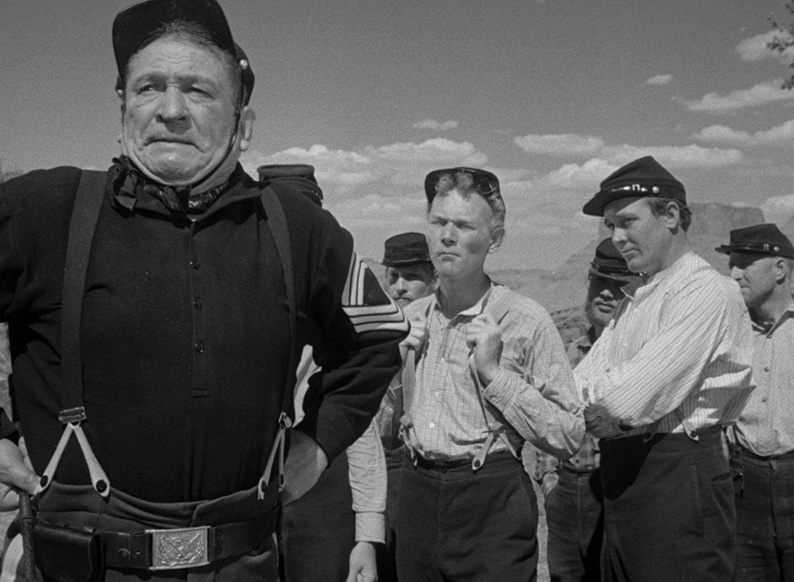
The formula established in the first two films of the series that gives Wayne the serious and reflective role and casts McLaglen as the character-comedy relief is repeated here, and frankly I wouldn't have it any other way. While his portrayal of Quincannon as a whiskey-loving, rule-breaking, rough-and-ready Irishman may skirt with cultural stereotype, he's always so effortlessly entertaining in this role that my heart lifts a little every time he makes an appearance. Tasked with shaping up the new recruits, he is initially flustered by casual indifference to the whole notion of discipline shown by two of their number, Travis Tyree (Ben Johnson) and Daniel "Sandy" Boone (Harry Carey Jr.). They nonetheless impress the hell out of him with their command of Roman-style horseback riding, a truly superb display of riding skills that involves standing on the saddles of two horses at once, a feat that was performed by the actors themselves. Indeed, so taken is he with them after this that when a local marshal shows up looking for Travis to arrest him for a past manslaughter, Quincannon denies knowledge of the name and sends him cheerfully on his way. Later, when things are looking more serious for Travis, he unsubtly prods the lad to flee to safety, something he does by stealing his commander's horse. His later return at an opportune moment to come to the aid of his comrades at risk to his own freedom plays almost like a trial run for Han Solo's departure and timely return during the final battle of Star Wars 27 years later.
The multiple strands of the main story are all interconnected here, as Kirby keeps a watchful eye on Jeff's fate and even makes to shield him from danger by assigning him to a party escorting women and children to safety (one that is then attacked by an Apache ambush), but not objecting later when Travis selects him and Sandy to accompany him on a dangerous mission into enemy territory. As Kirby's previously uncompromising devotion to his life as a soldier softens to allow Kathleen access to his more sensitive side, he seems more ready to accept that the son he wants to shield from harm should be free to follow a similar path to his father and discover for himself if this life is for him.
As ever with Ford, the landscape is a key character in the film, a blend of open plains, steep hillsides and towering buttes that has become a signature feature of the director's westerns, though here he was shooting in Moab in Utah instead of his beloved Monument Valley, not that most would likely be able to tell. Where the film does break uncomfortably from the previous films in the trilogy is in its Native American characters, who after receiving more sympathetic and rounded presentation in Fort Apache and She Wore a Yellow Ribbon are portrayed here as barbaric savages. It's a disappointing throwback to the genre's early days and something western authority Stephen Price puts down in part to fervent anti-communist screenwriter James Kevin McGuinness and even the cold war politics of the day. This hits a peak (or should that be a trough?) when Travis, Sandy and Jeff sneak into a village in which kidnapped children are being held by Apache raiders, and the Apache are shown stumbling around and dancing drunkenly like the primitives that bigots were too fond of claiming they were. Several Apache are then killed by the Cavalry boys using guns fired through a crucifix-shaped slot in the church door, a sequence whose religious overtones strip it of some of the air of triumph such a scene would normally have. Intriguingly, the film's only Mexican characters are treated by Kirby as equals and praised by him for their courage, an aspect that kicks against genre tradition in a way the presentation of the Apache characters frustratingly does not. And while I'm picking holes, there's also an odd reliance on undercranked camera to speed up movement in the action sequences. The problem is it's all too clearly visible, and in the scene in which the party of women, children and escort soldiers comes under attack, the constant reliance on this technique gives much of it the feel of a silent movie.
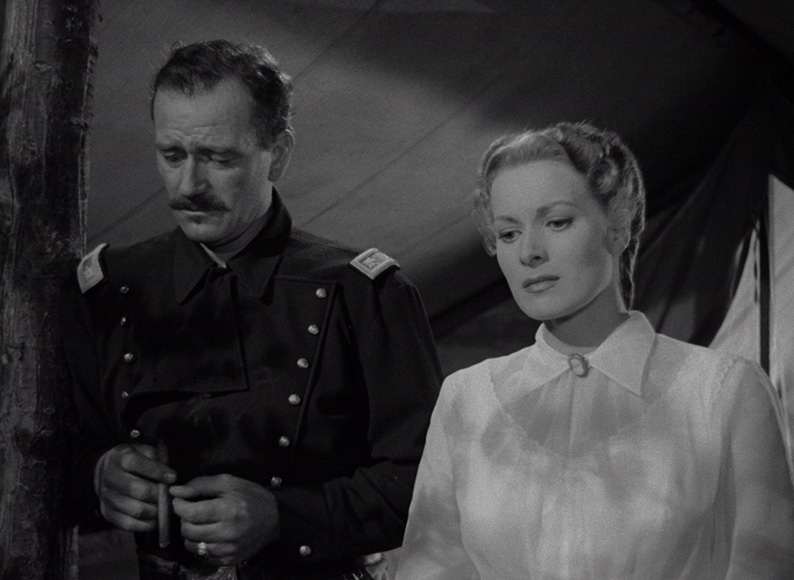
It's these elements that for me prevent Rio Grande from hitting the heights of its illustrious predecessors, but that shouldn't take away from what it gets right, and it gets so much right. Its honest portrait of a broken family and of a man who has put his career above his loved ones and pays the emotional price feels ahead of its time, the performances are terrific across the board, the night-time Apache hit-and-run raid on the camp is thrillingly staged, and the strength of its drama is balanced, as ever, by a delightful line in character-based comedy. As the film progresses, the sheer number of songs that pop up come close to qualifying it as a musical, but according to those with more knowledge of the subject than I, this is completely authentic, as singing songs was a common way of passing the time and keeping your spirits up in the cavalry of the day. It may have its distracting and outmoded aspects, but Rio Grande is still an enthralling and majestic western from one of giants of the genre, a film whose thematic layering and character complexity Ford would build on seven year later in his masterpiece, The Searchers, which gave Wayne the best and most complex role of his career.
The result of a new 2K restoration by Paramount's preservation department, the 1080p 1.37:1 transfer on Eureka's Blu-ray is generally very good but a couple of notches short of great. I don't have full details of the restoration, but I suspect it was drawn from more than source, which would explain a small number of visual inconsistencies. The best material looks very good indeed, with an attractive contrast range and cleanly rendered detail, but elsewhere the contrast is a tad more aggressive, with the solid black levels pulling in shadow detail, and much of the day-for-night footage looks a little flat and lacking in spark, though this may be down to the use of red filters at the shooting stage. Intermittently a shot turns up where the detail is a little softer than elsewhere. It seems clear that the restoration was not made from the original negative, as evidenced by the very visible reel change markers, which are optically added when prints are struck and usually painted out during the restoration process. These quibbles aside, this is still a solid job, though some former blemishes and traces of damage are still visible.
The Linear PCM 2.0 mono soundtrack is in good shape, with clear dialogue and music and no hissy trebles and no background hiss or damage.
Optional English subtitles for the hearing impaired have been included.
Audio Commentary by Western Authority Stephen Prince
Prince knows his western movies inside-out, ensuring there's barely a pause here and a ton of information provided on the film, the actors and the filmmakers, as well as detailed analysis and deconstruction of individual sequences and even shots. He highlights shot and sequences that show Ford's influence of Kurosawa Akira (who was a fan of Ford's films), notes changes that were made to the original story, and is even able to talk about each of the songs in some detail. How much you learn will depend on how well-read you are on the film and Ford's Cavalry Trilogy, but much of it was certainly new to me, though you will hear some of them repeated elsewhere on this disc, sometimes in extras that predate this commentary. Unsurprisingly, Prince is an enthusiastic fan of the film, but is also critical of its portrayal of the Apache and discusses its political overtones and how it was later read as a commentary on the war in Korea. He also nicely describes Ford as "America's epic cinematic poet."
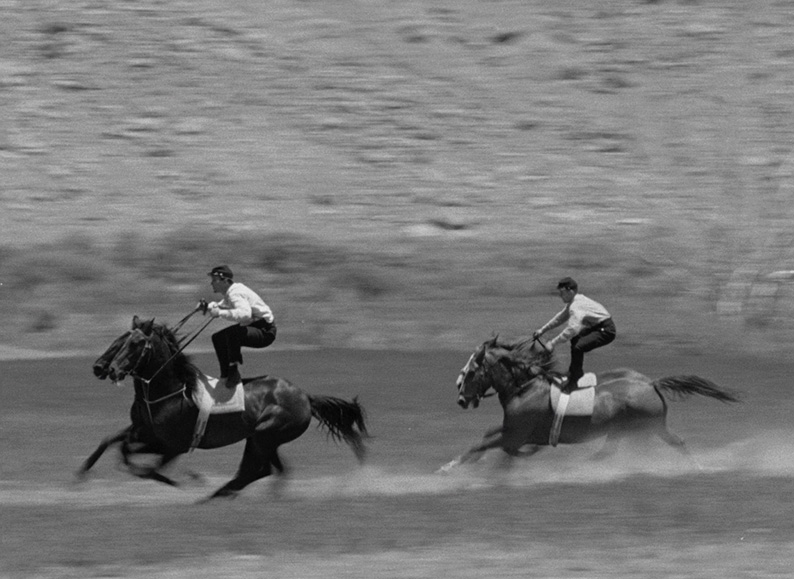
Audio Commentary by Maureen O'Hara
A most welcome second commentary by the film's co-star Maureen O'Hara, who kicks off with clear instructions on how the second word of the title should be pronounced ("Gran-deh" not "Grand") then recalls how the film came to be and how making it was a condition for getting The Quiet Man funded and shares stories of a shoot she has happy memories of. Some if the info here does turn up in other extras on this disc, but there is plenty that is unique to this extra, including a rumour – one that I've not seen confirmed elsewhere – that three of the Cavalry extras were swept away in the Colorado River and their bodies never found. She has some very positive things to say about working with Ford, but recalls that if you upset him then you would be "in the barrel" with him the next day and be given hell by him. There are some sizeable gaps here when O'Hara elects to watch the film or just listen to the dialogue, but when she does talk she does so with energy and passion.
Cavalry: A Video Essay by Tag Gallagher (10:37)
One of film scholar Tag Gallagher's more esoteric video essays highlights the effectiveness or technique of individual elements in a manner that has an engagingly cut-up feel, but I have to admit I learned nothing new from this. Mind you, the density of information and observation in Stephen Prince's commentary, which I listened to first, doesn't leave others with much scope to add more.
The Making of Rio Grande (21:13)
An archive featurette from 1993, hosted by ever-cheerful critic Leonard Maltin, that looks at how the film came to be, tells some stories of its making and examines some of its themes, and includes interviews with Harry Carey Jr., Ben Johnson and John Wayne's son Michael. Once again, much of what is discussed here is also in Stephen Prince's commentary track, but it's always good to hear in from the people involved and I can't help but suspect that this very featurette was part of his research. Particularly interesting are Johnson's comments about Ford, of whom he tellingly says, "He'd ask your advice, but you'd better not give it to him."
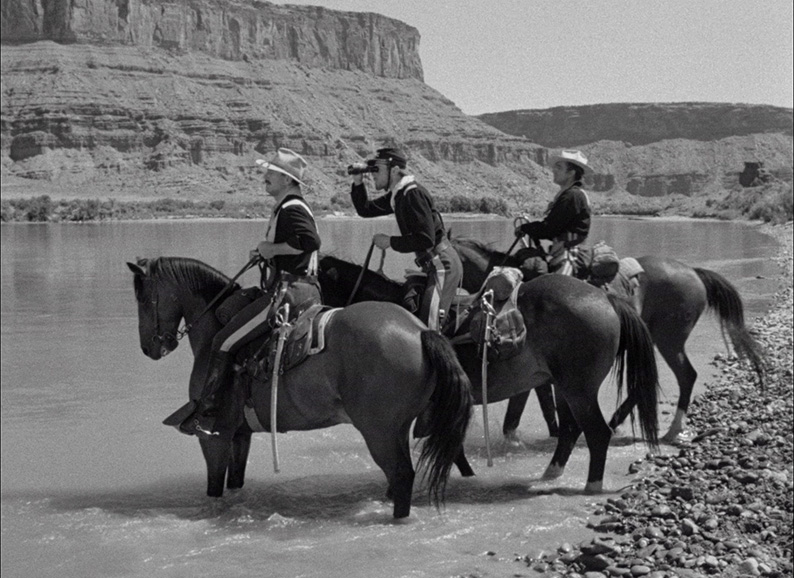
Along the Rio Grande (18:36)
Another archive featurette, this one from 2002 and built around interviews with Maureen O'Hara and director Andrew V. McLagen (Shenandoah, Chisum, North Sea Hijack), the son of actor Victor McLaglen and second unit director on The Quiet Man. O'Hara shares stories of the shoot and her chemistry with John Wayne, whom she proudly recalls referred to her as "a great guy," while McLagen talks about his father's career, O'Hara's working relationship with Wayne and Sons of the Pioneers lead singer Ken Curtis.
Trailer (1:38)
"The screen trembles with excitement" shouts the second caption of this trailer (the first just yells "Attack!") before the narrator pops up to assure us, in a heart-warming display of 50s sexism, that the film features John Wayne in the greatest role he's ever played and Maureen O'Hara looking lovelier than ever. John Ford gets a mention, which gives you an idea of his status even back when the names of directors weren't anything like as well-known with the viewing public as they've since become.
Also included is a Collector's Booklet featuring a new essay by western expert Howard Hughes, a new essay by film writer Phil Hoad, a transcript of an interview with John Ford, and excerpts from a conversation with Harry Carey, Jr., but this was not available for review.
Another damned fine John Ford western that doesn't quite hit the heights of its illustrious predecessors, the poetry of its best scenes undercut a little by its retrograde view of Native Americans and the overuse of undercranked camera in action scenes. The best material is so good that this is still an essential film for genre fans, and although the restoration has its very visible imperfections, it's still a solid job, and the special features are excellent.
|